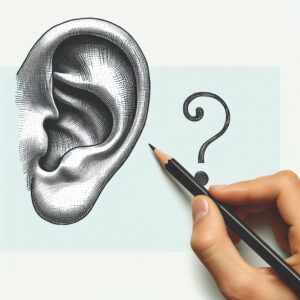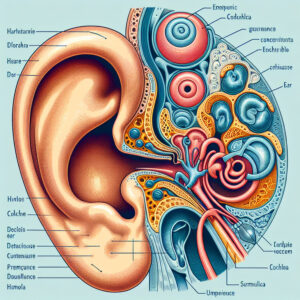Living with the Tinnitus Hissing Sound: Tips for Daily Life
Understanding the Tinnitus Hissing Sound What is Tinnitus Hissing Sound? The tinnitus hissing sound is a common auditory condition where individuals hear a persistent hissing noise. This sound is often perceived in the absence of any external sound source and can vary in intensity and frequency. Unlike other forms of tinnitus, which might manifest as… Read More
Navigating Life After Measles Hearing Loss: Coping Strategies and Support
Introduction to Measles Hearing Loss Understanding Measles and Its Complications Measles, a highly contagious viral disease, primarily affects children but can strike anyone unvaccinated. Characterized by symptoms such as fever, cough, runny nose, and a distinctive red rash, measles can lead to severe complications. These include pneumonia, encephalitis, and, notably, hearing loss. Despite global vaccination… Read More
Genetics: The Most Common Cause of Sensorineural Hearing Loss Explained
Introduction to Sensorineural Hearing Loss Defining Sensorineural Hearing Loss Sensorineural hearing loss (SNHL) is a type of hearing impairment that results from damage to the inner ear or the nerve pathways leading from the inner ear to the brain. This condition can affect one or both ears and is often permanent. SNHL is distinct from… Read More
Dealing with the Most Common Cause of Conductive Hearing Loss
Introduction to Conductive Hearing Loss Conductive hearing loss is a condition where sound waves are impeded from traveling through the outer ear, tympanic membrane, or middle ear bones. This type of hearing impairment is distinct from sensorineural hearing loss, which involves nerve damage in the inner ear. Understanding the causes of conductive hearing loss is… Read More
How to Improve Your Hearing: Expert Advice and Techniques
How to Improve Your Hearing: Expert Advice and Techniques Understanding Hearing Loss Types of Hearing Loss Hearing loss can be broadly categorized into three types: sensorineural, conductive, and mixed. Sensorineural hearing loss involves damage to the inner ear or auditory nerve and is usually permanent. Conductive hearing loss occurs when sound waves cannot reach the… Read More
Is Sudden Hearing Loss in One Ear for a Few Seconds a Sign of a Serious Issue?
Introduction to Sudden Hearing Loss in One Ear for a Few Seconds Definition and Overview: Sudden hearing loss in one ear for a few seconds can be an alarming experience. Essentially, it is a temporary and often unexplained loss of hearing in one ear that typically resolves within a short period. This brief phenomenon can… Read More
Natural Ways to Stop Tinnitus: Remedies That Work
Introduction to Tinnitus Tinnitus is a condition characterized by the perception of noise or ringing in the ears, which is not caused by an external sound. Many describe it as a constant ringing, buzzing, or hissing noise. Tinnitus can affect one or both ears and varies in intensity and frequency. It can be a symptom… Read More
The Science Behind Cochlear Concussion: Causes and Effects
Introduction to Cochlear Concussion Definition of Cochlear Concussion Cochlear concussion, a lesser-known hearing disorder, occurs when the delicate structures within the cochlea are disrupted due to external trauma. Unlike other forms of hearing loss, cochlear concussion is typically caused by a sudden impact or acoustic shock rather than gradual wear and tear. It can lead… Read More
The Science Behind Widex Zen Tinnitus and Its Effectiveness
Introduction to Widex Zen Tinnitus Tinnitus, often described as a persistent ringing or buzzing in the ears, can be incredibly disruptive to everyday life. Understanding and managing this condition is crucial for those affected. Widex Zen Tinnitus offers a unique approach to alleviating tinnitus symptoms through advanced sound therapy. This blog post will delve into… Read More
Tinnitus and Heart Disease: Symptoms, Causes, and Treatments
Introduction to Tinnitus and Heart Disease Overview of Tinnitus Tinnitus is a common auditory condition characterized by the perception of noise or ringing in the ears when no external sound is present. It can vary in pitch and intensity, and while it is not a disease itself, it often signals an underlying condition. Tinnitus affects… Read More
Why Folic Acid Could Be Key in Tinnitus Prevention
Introduction to Tinnitus and Folic Acid Overview of Tinnitus Tinnitus is a condition characterized by the perception of noise or ringing in the ears. This sensation is not caused by an external sound and can vary from a mild background noise to a loud, disruptive sound. It affects millions of people worldwide, making it a… Read More
How Levo Tinnitus Therapy is Changing Lives
Introduction to Levo Tinnitus Therapy Tinnitus is a condition characterized by the perception of noise or ringing in the ears without an external sound source. This often debilitating condition affects millions of people worldwide, leading to various complications including sleep disturbances, difficulties in concentration, and emotional distress. In recent years, Levo Tinnitus Therapy has emerged… Read More
Tinnitus RACGP: Addressing Hearing Disorders in Primary Care
Introduction to Tinnitus and RACGP What is Tinnitus? Tinnitus is the perception of noise or ringing in the ears when no external sound is present. It is a common problem that affects about 15-20% of people. Tinnitus itself is not a condition but a symptom of an underlying condition, such as age-related hearing loss, ear… Read More
Living with Tinnitus: Steve Martin’s Experience
Introduction to Steve Martin’s Tinnitus Journey Steve Martin, a name synonymous with comedy, acting, and music, has been a beloved figure in the entertainment industry for decades. But behind his charismatic performances and witty humor lies a personal struggle that many may not be aware of—tinnitus. Tinnitus is a hearing disorder characterized by the perception… Read More
Sudden High Frequency Hearing Loss: Common Myths and Facts
Introduction to Sudden High Frequency Hearing Loss Definition and Overview Sudden high frequency hearing loss refers to the abrupt loss of hearing in the higher frequencies, typically above 2,000 Hz. This condition can occur in one or both ears and often manifests without warning. Unlike general hearing loss, which usually develops gradually over time, sudden… Read More
















